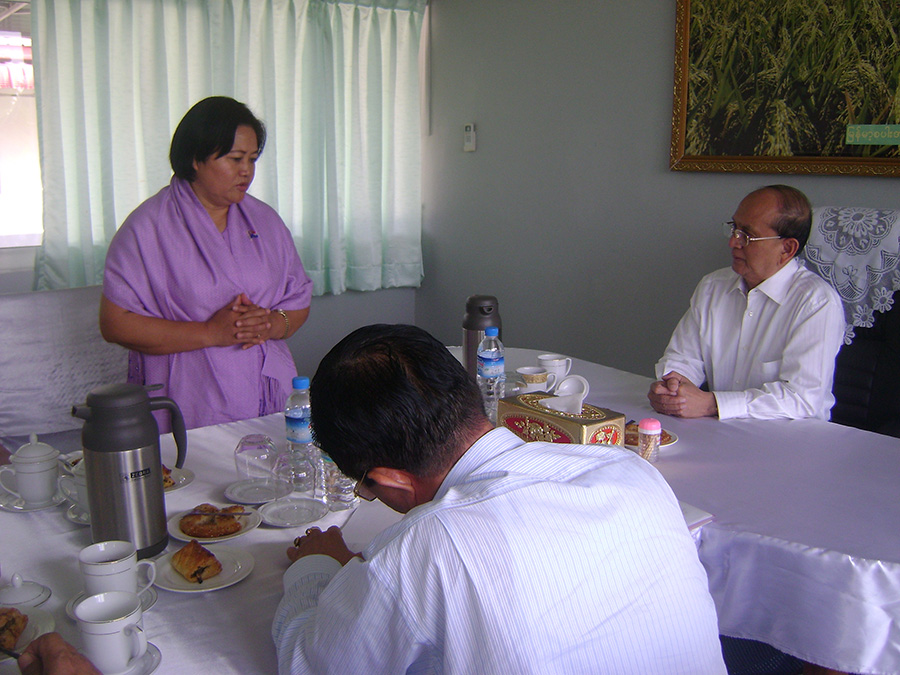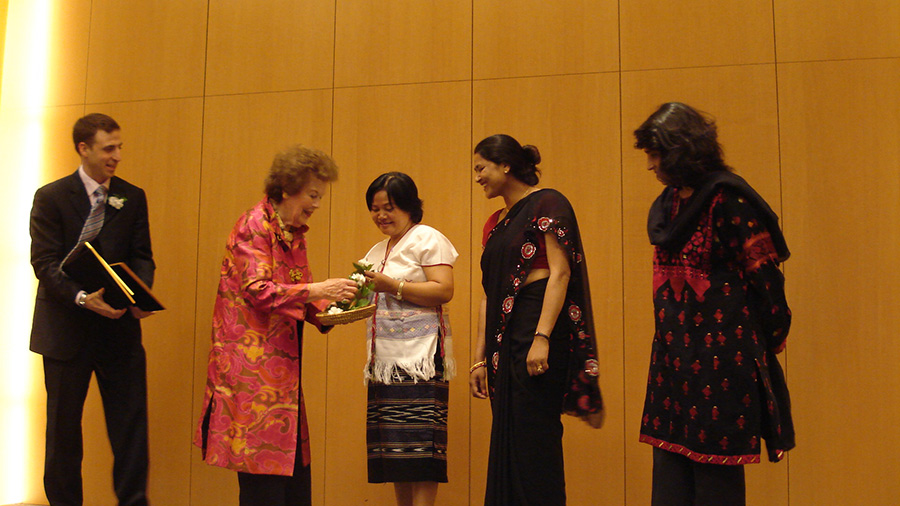MAE SARIANG, Thailand — Longstanding Karen National Union (KNU) leader Naw Zipporah Sein, 62, begins to cry, as she recalls the fate of her old classmate at the hands of the Burma Army in Mon Township, Nyaung Lin Bin District, in May 1975.
“They stripped her and kept her in the heat for days,” she says. “She was pregnant. They raped her and took out her eyes one by one. Then they finally killed her.”
Burmese military troops had shot the woman’s husband, a KNU soldier, in a gunfight before dragging the 20-year-old schoolteacher into the middle of Mee Ya Tar Village in the KNU’s Brigade 3 territory, witnesses told Naw Zipporah Sein.
“My eldest and youngest sisters’ boyfriends died in battle. My boyfriend also fell in battle when I was 19,” she says.
Naw Zipporah Sein was born in Karen State, where a 60-year-long conflict between the Burma Army and ethnic groups fighting for independence has left hundreds of thousands dead or displaced, with many Karen fleeing to neighboring Thailand.
Memories of war are painfully fresh for the former KNU vice chairperson.
“If men die in battle, it is over. If they don’t die, they win. For them, it sounds simple, but for women, the suffering remains like a wound. It is traumatic.
“Their fear of war is like a clear picture that doesn’t fade away easily,” she tremors, reclining on her wooden chair.
Struggling to hold the strength of the memories, she stops and takes a sip of water.
“Women worry whether their children will die or their husbands will be killed. They always live in fear. It takes time to heal those traumas,” she says.
Naw Zipporah Sein served the KNU as a schoolteacher, women’s rights activist, general secretary, and vice chairperson. She failed in her bid for the group’s leadership in its recent election due to an internal power struggle.

She takes a cautious approach to Burma’s peace process, an attempt at national reconciliation between ethnic armed groups and the Burmese government begun in 2011 during President Thein Sein’s government.
Because of this approach, Burmese peace negotiators and some observers brand her as a “hardliner,” which she finds surprising, as her experience has molded her into an advocate for peace.
Lamenting on what war means for women, she says, “We are the ones who suffered. When I was only two years old, our family began moving from place to place for our safety.
“My mother gave birth while fleeing the war—that’s how long I have experienced the suffering of war, since I was a child.”
While husbands fight, she reflects, mothers take care of the children, and worry.
“They have a hard time,” she says. “I have been dreaming of peace since my childhood, searching for the peace we lost.”
In her experience, men approach the path to peace differently from women; her own approach is careful and exhaustive, she says, ensuring the safety of civilians—especially women.
“Men think superficially because they don’t suffer like women do,” she says. “Women think with more detail. When they fight, men kill each other, but the fighting stops when they strike a deal. When they reach a deal at the top level they think war is over.”
Remembering the sexual abuse women have endured during conflicts, and incidents when they are forced to porter—and while doing so, sometimes killed and rape—she concludes that war is worse for women.
The prevalence of sexual abuse against women in Burma has been fueled by decades-long civil wars. In 2002, a report titled “License to Rape,” released by Shan Women’s Action Network (SWAN) and Shan Human Rights Foundation (SHRF) attracted international attention to the issue.
It highlighted 173 incidents of rape and other forms of sexual violence involving more than 600 girls and women committed by the Burma Army in Shan State between 1996 and 2001.
“Men only know how to wage war,” she says. “They fight and stop fighting depending on their wants, but they don’t understand how women suffer.”
But women are not necessarily passive: the leader has witnessed incidents where women serve as village heads, as men feared being tortured by Burma Army troops. Men or not, the troops would often still intimidate, torture, and kill the village heads, she adds.
Tatmadaw representatives for the peace process see her as a “hardliner” because her past strongly influences her negotiations, she judges.

“The ceasefire does not only mean stopping the fighting. There should be safety for civilians, including women, which is why we pointed out that Burma Army troops should move away from villages,” she says.
“Civilians have witnessed their houses burned down by the troops, and their belongingness looted.”
While serving as general secretary and vice chairperson in the KNU, Naw Zipporah Sein met with Burmese government peace negotiators several times in Naypyidaw, Rangoon, and Chiang Mai in northern Thailand.
Before joining the KNU’s top leadership, she was the chairperson of the Karen Women’s Organisation (KWO).
People in Karen State have been displaced by war for more than two decades. There are more than 120,000 refugees living on Thai-Burma border, the majority ethnic Karen.
The KNU signed a bilateral ceasefire with the former Burmese government in 2012 and the Nationwide Ceasefire Agreement (NCA) in 2015. However, the Burma Army did not withdraw their troops from the KNU’s controlled territories.
As Burma’s longest running ethnic armed organization (EAO), the KNU has been fighting for autonomy and self-determination against the Burmese government since 1949—a year after Burma declared independence from the United Kingdom.
It is one of the bigger EAOs, and one of the eight that signed the NCA. In the peace process, the Burma Army’s withdrawal and repositioning should be prioritized, says Naw Zipporah Sein, also emphasizing a need for the military to earn trust from civilians.
Most displaced people dare not return to their villages after experiencing brutal treatment from Tatmadaw troops. Women are particularly vulnerable, despite the Burma Army ensuring their safety.
“Bad memories still linger,” says Naw Zipporah Sein. “The Burma Army and our leaders should think about the safety of women.”
It is inadequate, she says, that the wagers of war—the Burma Army and the KNU leadership—now say they understand each other.
“They might say they love each other now,” she says. “They militaries might reconcile, but it is important that they show evidence they care for the safety of civilians.”

















